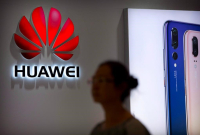Support strong Canadian climate journalism for 2025
Remarks by U.S. President Donald Trump could be used by Huawei's chief financial officer Meng Wanzhou to fight her extradition to the United States, Canada's foreign minister said Wednesday.
Chrystia Freeland said any comments made in the United States could be used by Meng's lawyers before Canadian courts, which would have to judge their relevance in deciding whether to follow through on the American extradition request.
The Liberals have gone out of their way to show they are keeping politics out of the extradition process of the high-profile Chinese executive, warning it could impact the case in Canada.
Trump's musing Tuesday about interfering in Meng's case is fuelling Beijing conspiracy theories about Canada's true intent behind detaining Meng. Canadian officials cited the mounting criticism against Canada in China, including on social media, behind their reason to bolster the security of diplomats in the People's Republic.
Trump complicated Canada's stance after he told Reuters Tuesday evening he would "certainly intervene if I thought it was necessary" in Meng's case, if it would help him forge a trade deal with China. China's state-run media was already ridiculing Canada's assertion that Meng would be dealt with fairly and transparently by an independent judiciary, the same view U.S. Ambassador Kelly Craft put forward.
Freeland carefully avoided mentioning Trump by name, but she said she spoke with her U.S. counterpart, Secretary of State Mike Pompeo, about the case on Wednesday.
The minister said it was "quite obvious" that anyone "seeking an extradition from Canada" has to recognize Canada is a rule of law country and that "any extradition request is about ensuring that justice is done, is about ensuring that the rule of law is respected and is not politicized or used for any other purpose."
Earlier Wednesday, Prime Minister Justin Trudeau reaffirmed Canada's commitment to the rule of law, "regardless of what goes on in other countries."
The government dispatched five senior officials to hammer home the message, while Justice Minister Jody Wilson-Raybould said Wednesday that she takes her "extradition responsibilities and obligations very seriously" and reiterated that the final decision lies with her.
If Canada's courts approve Meng's extradition — a process that officials suggested could take years — "then as the minister of justice, I will ultimately have to decide on the issue of surrender of the person sought for extradition," Wilson-Raybould said in a statement.
The minister said she wouldn't say any more because that "would risk undermining both the independence of the court proceedings and the proper functioning of Canada’s extradition process."
Canadian diplomats in China have been advised to take extra precautions because of Chinese criticism, including on social media, over the arrest of a Chinese business executive, officials said Wednesday.
A senior Canadian government official, briefing reporters on the condition of anonymity, said the federal government expressed concerns to the Chinese government over the criticism and asked the Chinese for extra security around its embassy and other places in China.
China, as the host country, is responsible for the security of foreign diplomats on its soil, the official said.
"We have made them aware of our concerns and they have stepped up," said an official. "We have asked our staff to be prudent."
Two former policy advisers in the Prime Minister's Office said Canada has only one choice: stay true to its adherence to the rule of law and hope that Trump's involvement can somehow be treated as one more impromptu comment by an unpredictable president.
"I think we're lonelier than we've been in a long, long time," said David Mulroney, who served former Conservative prime minister Stephen Harper as his first foreign-policy adviser and later as ambassador to China. "(Trump) gave credibility to an outrageous Chinese accusation — that the RCMP basically works as an extension of the U.S. government to capture a hostage who can be used in their trade negotiations."
Roland Paris, who was Trudeau's first foreign-policy adviser, said Canada has for decades enjoyed the luxury of operating in "a very comfortable international context," but not any more.
"Now, a lot of the assumptions that have guided our foreign policy are in question, including whether the United States has our back," said Paris, a University of Ottawa international-affairs professor.
Both pointed to the fact that just hours before Trump sounded off, his ambassador to Canada was extolling the same separation of the law and politics as the Trudeau government.
Secretary of State Mike Pompeo appeared to double down on Trump's line on Wednesday in a televised interview with Fox and Friends.
"We always have to balance American interests. Any time there's a law enforcement engagement, we need to make sure we take foreign-policy ... considerations into effect," said Pompeo. "It's totally appropriate to do so. The president's mission is very clear. It's America First, right?"
Paul Evans, a China expert at the University of British Columbia, says the Chinese are listening and taking note.
"From a realist Chinese perspective, the Trump comment and the followup from Pompeo signal that law and politics are not separable, something they know in their bones," said Evans.
"Here in Canada, abiding by the rule of law is a way of detaching the government from taking a position on a US-China conflict that they desperately want to duck. In this case we are neither hypocritical nor naive."





Comments